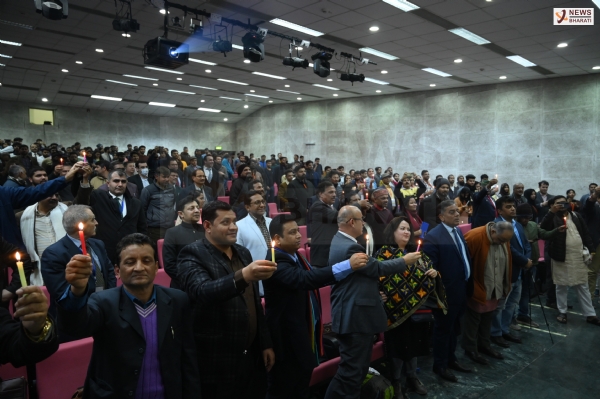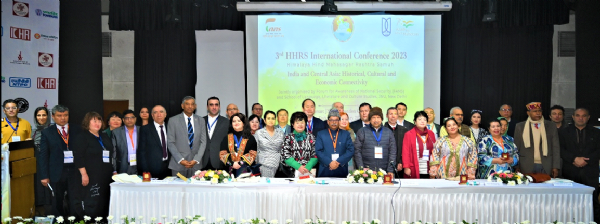New Delhi, Feb 7: Scholars and statesmen/politicians and representatives of the governments of the Central Asian Region had gathered here to participate in the 3rd International Conference of the Himalaya-Hind Mahasagar Rashtra Samuh on India and Central Asia: Historical, Cultural and Economic Connectivity.
The conference was organized by the School of Language, Literature and Cultural Studies, Jawaharlal Nehru University (JNU), New Delhi, in collaboration with Forum for Awareness of National Security (FANS) at the Convention Centre, JNU. The co-partners of the conference were Indian Council of Social Science Research (ICSSR), Indira Gandhi National Centre for the Arts (IGNCA), Power grid, NTPC, Indian Council of Historical Research (ICHR), and Nishpaksh Pratidin.
Approximately 500 delegates including dignitaries from Uzbekistan, Tajikistan, Turkmenistan, Kyrgyzstan, Iran, Azerbaijan, Armenia, Mongolia, Afghanistan and Kazakhstan, along with representatives of the Indian Defense Services and Indian Civil Services, academicians, researchers, scholars and social thinkers from India and abroad participated in the conference.
The objective of the conference was to discuss the longstanding historical, cultural, political and economic relationship between India and Central Asia. The conference shed new light on the deep cultural linkages between the two regions, in terms of people-to-people contact, historical linkages, trade and commerce, among other topics.
Presenting a keynote address at the inaugural session of the conference, Indresh Kumar, RSS National Executive member and Patron of FANS shared his views on the importance of diversity and tolerant nature of Bharatiya society. Deliberating on the philosophy of ‘Vasudhaiva Kutmbakam’ in the present context, he said that Bharat never wanted to invade any nation or subjugate people. On the other hand, the Bharatiya people, wherever they went, enhanced and value added the local culture and traditions.
Appealing to the people to strive for peace and non-violence, he said Bharat can be the best leader of the world in this mission of propagating peace and universal brotherhood. Unfolding the beauty of different names Indresh Kumar said that these names like Aryavarta, Hindustan, Hind and Bharat are based on the quality and character of the nation and not merely on its geographical entity or expanse. He strongly remarked that the title of Vishwaguru belongs to India because India has shown remarkable characteristics to lead the world on principles of peace, brotherhood and development. He concluded his address with the promising motto of “Jai Bharat, Jai Asia, Jai Jagat.”
In his introductory remarks, Prof. M. Mahtab Alam Rizvi observed that India has played a significant role in the Central Asian region since time immemorial. He also focused on the standard foreign policies of India in the last few years. According to Prof. Rizvi, Prime Minister Narendra Modi has made a significant observation about India and Central Asia relationship by deliberating on three important points: mutual cooperation with Central Asian countries for security, creation of effective strategies of cooperation, and charting a road map for future cooperation.
Mahesh Chandra Sharma (Director, RDFIH) delivered a poignant speech on the nuances of the concept of nation-state. According to him, there should be a serious academic discourse on ‘geo-cultural nationalism.’
Lt. Gen. (Retd.) R. N. Singh, National President of FANS, in his address, highlighted the role of India in establishing mutual cooperation among central Asian countries. Maj Gen (Retd) Souresh Bhattacharya, President of the Delhi chapter of FANS also cast light on the role of HHRS conference in creating an academic platform for discussion on key issues related to India and Central Asia.
Golok Behari Rai, National General Secretary of FANS, in his address, observed that the Bharatiya culture spread in the Central Asian region without the use of weapons and deployment of armies because traders, artists and scholars were the cultural ambassadors of Bharatiya Parampara.
At the opening of the session, Prof. Mazhar Asif, the Coordinator of the conference delivered his welcome speech. Besides Indresh Kumar, the Inaugural Session was graced by the presence of Mahesh Chandra Sharma (Director, RDFIH), Golok Behari Rai (National General Secretary, FANS), Lt. Gen. (Retd.) R. N. Singh (National President, FANS), Maj. Gen. (Retd.) S. Bhattacharya (President, FANS, Delhi Chapter), Prof. Mazhar Asif (Dean, SLL&CS, JNU), Prof. M. Mahtab Alam Rizvi (Jamia Millia Islamia, New Delhi) and other dignitaries.
Scholars of repute from various central Asian nations including Uzbekistan, Tajikistan, Turkmenistan, Kyrgyzstan, Iran, Azerbaijan, Armenia, Mongolia, Afghanistan and Kazakhstan, and also from India, presented research papers during the six business sessions that followed on the various topics of the mutual cooperation and trust underlining the need for a peaceful and violence-free world order.
Taking the thread of the discussions at the business sessions further, Indresh Kumar in his valedictory address stressed that nobody is a kaffir in this world because we are all believers, though in different gods and spiritual principles.
He urged the world to strongly condemn the terror activities, which, according to him, are the enemies of peace and progress in the world. The world should be free of terrorism. We must ensure a world free of war and riots. He further said that division and discrimination based on religion and caste are the biggest obstacles in achieving a riot-free world. He appealed to everyone to respect all religions, sects and communities for establishing brotherhood and mutual respect in the society. He envisioned an ‘untouchability-free world’ that would lead to mutual respect, cooperation and enhanced communication.
Stating that communication is the most imperative aspect of mutual cooperation among nations, he said that the 3rd HHRS conference should pave the way for better communication and connectivity, improved bilateral relations and enhanced cultural and economic ties between India and Central Asia.
Valedictory session that was graced by the presence of H.E. Mr. Iraj Elahi, Ambassador of Iran to India, H.E. Mr. Darkhan Seitenov, Deputy Head of Mission of Kazakhstan to India, H.E. Habibullo Mirzozoda, Deputy Chief of Mission of Tajikistan to India, H.E. Aziz Baratov, Deputy Chief of Mission of Uzbekistan to India, H.E. Isgender Ataliyev, Third Secretary, Embassy of Turkmenistan to India, Dr. Subhas Sarkar, Minister of State for Education, Iqbal Singh Lalpura, Chairperson: National Minority Commission, New Delhi, L.t Gen (Retd.) K. J. Singh, Dr. Sachin Gupta, Chancellor, Sanskriti University, Prof. M. Mahtab Alam Rizvi and several delegates of Central Asian nations.
In his address, H.E. Habibullo Mirzoda discussed the dissemination of the knowledge related to the greatest of Indian and Persian literature in Tajikistan. He observed that ‘in the second half of the twentieth century, several Tajiki scholars began to study Indian and Persian literature.’ He also praised India as the custodian of this precious literary treasure and the initiative taken to digitise this literary treasure.
H.E. Mr. Darkhan Seitenov mentioned various summits and events organised by India and Central Asian countries to discuss the varied aspects of this relationship. He said after the first India and Central Asia summit 2022, these countries adopted the declarations for the prospective spheres of progress, like trade, energy, health-care to name a few. According to him, the bilateral relationship between these two regions has been developing by leap and bounds and the future holds great prospects for India and Central Asia.
H.E. Aziz Baratov observed that India and Uzbekistan share centuries-old friendly relationships. According to him, one of the objectives of Uzbekistan’s foreign policy is to create an atmosphere of peace, stability and security. He said that strengthening the mutual relationship between India and Uzbekistan is one of the prime objectives of their foreign policies. He also praised the first India and Central Asia summit because it opened a new page in their shared international relations.
H.E. Mr. Iraj Elahi, in his address, discussed the relationship between Iran and India. He said that literature and overlapping culture connect the people of this region. He opined that Iran can play an important role in connecting India and Central Asia. India, Iran and Central Asia need a reliable link in this region for development and progress. A road through Chabahar port can act as a symbol of civilizational and cultural synergy.
Dr. Sachin Gupta focused on the various initiatives/steps that could be taken to strengthen the relationship between India and Central Asia. He also highlighted the importance of exchange programmes and collaboration among different universities from these regions to share knowledge and expertise for a better and prosperous future. This will help in bridging the divide between the nations. He also mentioned various initiatives taken by Sanskriti University in the academic field.
Iqbal Singh Lalpura reflected on the message that every religion of the world upholds. i. e. love, service to humanity, and understanding for others. He mentioned various instances of cultural confluence. As an example, he cited the presence of Buddha’s statue in Afghanistan, and also how Guru Nanak visited these Arabian countries and studied their culture and interacted with them and brought their culture to India. Lalpura also shed light on the ancient trade relations and cultural confluence among these countries.
In his address, Union Minister Dr. Subhas Sarkar, deliberated upon the ancient cultural and linguistic ties of central Asia and India that are evident from the excavations of Tak-Mak region of Kyrgyzstan, Amu Darya Valley in Southern Uzbekistan, North-East of Samarkand in Uzbekistan and several other regions of Central Asia.
He also discussed the historical ties between two regions as a mark of centuries-old relationship with those continues which exists even today. Dr. Sarkar also shed light on how the ancient Indian scriptures and epics like the Mahabharata give us insights on the easy mobility and continuous transactions of the people from both the regions.
He noted the key objectives underlined by Prime Minister Narendra Modi in the first India-Central Asia summit for enhancing connectivity between two regions – to make it clear that mutual cooperation is essential for regional security and prosperity, to create an effective structure for cooperation, and to create an ambitious roadmap for future collaboration.
According to him, the New Education Policy (NEP) 2020 would also aid the country to lead the world as per the principle of ‘Vasudhaiva Kutumbakam.' He concluded his address by quoting India’s vision of ‘One Earth, One Family, One Future.’
The two-day Conference concluded with a cultural programme by the students of Jawaharlal Nehru University. The group ‘hamari parampara’ is an initiative led by university students to protect and celebrate the Indian art, culture and tradition.
--




